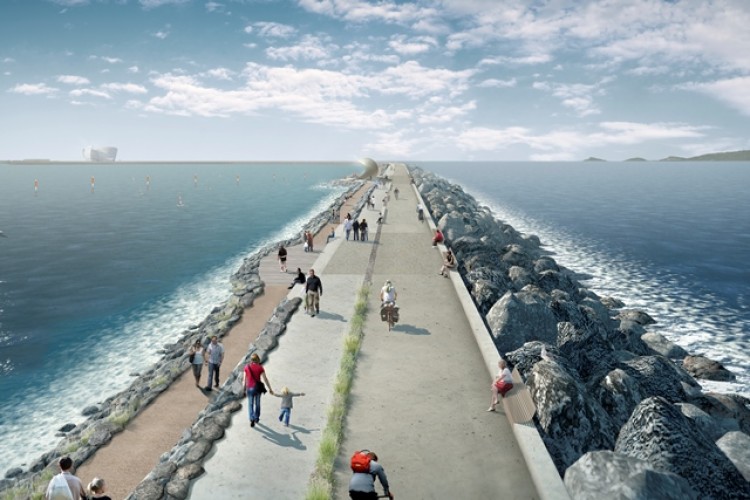He challenged the numbers used by ministers that show his scheme is three times more expensive than new nuclear power. He said the analysis had “come out of the blue”.
Snubbed by the UK government, Tidal Lagoon Power is now courting overseas governments for support.
Mark Shorrock also owns Dean Quarry in Cornwall, purchased from Cemex with an aspiration to ship five millions tonnes of rock to Swansea to construct the lagoon, so rejection by government is a double blow to him.
He said: “The secretary of state [Greg Clark] is clearly misinformed... He says Swansea Bay Tidal Lagoon will cost three times nuclear. This is incorrect. Swansea Bay Tidal Lagoon will add just 30 pence to consumers’ bills whereas Hinkley Point C will add £12 or more to bills.
“The offer to the UK government for Swansea is at the same price as nuclear for a small pathfinder which as he acknowledges is 0.15% of the UK’s energy requirements. The UK’s second proposed tidal lagoon at Cardiff would be 88 times less expensive for consumers than Hinkley. Furthermore, the £1.3bn build cost of Swansea is privately funded. It is not a cost to consumers as suggested by Mr Clark."
Mr Shorrock continued: “This is a vote of no interest in Wales, no confidence in British manufacturing and no care for the planet. Justified through a faux concern for consumers who would readily invest in a British tidal power industry for today and for future generations.
“Wales contributed more than 5% of the budget currently available to BEIS for renewables. Launching a new tidal lagoon industry requires less than 5% of the budget and adds a modest 30 pence yearly cost to energy bills. We note that government has chosen not to answer the question clearly put to it by Welsh government: will Swansea Bay Tidal Lagoon be offered a contract of equal price and terms to that already offered to Hinkley Point C?
“We heard the secretary of state refer to the advice of several independent reports today. We should now like to scrutinise these reports. They have come out of the blue and make some bold claims. It is notable that they are leading policy in a way that the Hendry Review is not, not least it’s clear conclusion that following the pathfinder, tidal lagoons are cost competitive for consumers with wind and nuclear.

“The secretary of state today appeared to airbrush from history the full story of the UK’s success in offshore wind. It has indeed been a success and it has cost the nation some £8bn in subsidy to make it so. Tidal power deserves the chance to make its contribution to the energy mix and the national economy and it will be able to do so for a much, much smaller price tag.
“The government position on tidal lagoons is one of contradiction: open to tidal lagoons in the future but closed to the pathfinder project that makes them possible; keen to talk to other marine developers having repeatedly refused to talk to the only developer with a consented project ready to go; concerned that it’s a relatively small project and yet blind to the fact that means its impact on energy bills is extremely modest; concerned for a steel sector already exempt from environmental levies and for whom, according to the Hendry Review, tidal lagoons throw a ‘lifeline’; worried that it will be twice the price of nuclear when the contract requested is exactly the same as nuclear; flagging that nuclear projects generate more power than tidal lagoons but ignoring that they last for half as long; flagging the manifesto commitment to keep energy costs down yet ignoring the prior manifesto commitment to Swansea Bay Tidal Lagoon; questioning the number of long-term jobs at the same time as assigning no value to the creation of thousands of supply chain jobs and hundreds of non-energy jobs created on site; concern over demonstrably low decommissioning costs already accounted for in the modelling and yet no engagement on the matter since a 2015 consultation.
“Having artificially deflated new nuclear strike prices by transferring a huge burden of cost and risk to consumers, it is beyond rich for UK government to imply that investment from Welsh government to kick-start a new Welsh tidal industry somehow hides the true cost of the pathfinder lagoon and obstructs a like-for-like comparison with nuclear.
“The like-for-like comparison is that both Swansea and Hinkley Point C need a contract of £92.5 for 35 years, combined with other forms of government support. The difference is that one is a small bet on a homegrown and reliable energy future with minimal impact on consumers (30 pence a year on bills), the other is a massive gamble with energy security to the advantage of foreign companies and at huge cost to consumers (up to £15 a year on bills).
“We have worked to secure a critical change in the UK’s energy mix. There is unquestionably a role for tidal lagoons as a scale low carbon power source and as major contributors to the national economy. Any island nation blessed with a natural resource like ours must surely want to nurture a homegrown tidal power industry.
“Together with Welsh government we will deliver a UK tidal lagoon industry centred in Wales. Swansea Bay Tidal Lagoon remains key to our vision.
“While we establish the way forward for our Welsh projects, greater emphasis will naturally be placed upon the projects we are already developing in international waters, including those in northern France.”
Got a story? Email news@theconstructionindex.co.uk



